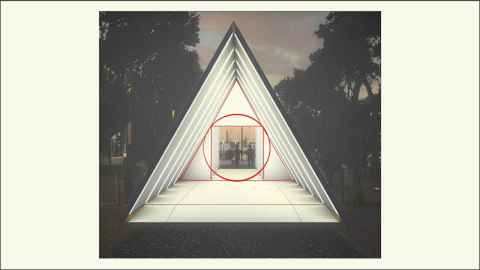Made in lights, in honour of da Vinci’s tribute to Vitruvius
6 May 2019
An installation by Matt Liggins, Professional Teaching Fellow at the University of Auckland’s School of Architecture, is one of almost 20 artworks to light up the waterfront at this week’s Bright Nights exhibition.

An installation by Matt Liggins, Professional Teaching Fellow at the University of Auckland’s School of Architecture, is one of almost 20 artworks to light up the waterfront at this week’s Bright Nights exhibition.
When not teaching at the University, Mr Liggins has a cross-discipline practice in which in works as both artist and architect. “Vitruvian Tunnel”, which is making a debut at Bright Nights, draws attention to the historic connection between both disciplines.
“Vitruvian Tunnel” is a reference to the drawing “Vitruvian Man” by Leonardo da Vinci, the polymath who died this week 500 years ago, on May 2, 1519.
Da Vinci’s drawing depicts a man in two superimposed positions with his arms and legs apart and inscribed in a circle and square. It is based on the correlations of ideal human body proportions, and geometry described by the ancient Roman architect Vitruvius.
In Book III of his treatise De architectura, Vetruvius described the human figure as being the principal source of proportion among the classical orders of architecture.
He determined that the ideal body should be eight heads high. Leonardo's drawing is traditionally named in honour of the architect, and Matt’s contemporary artwork is in honour of Leonardo da Vinci.
“Vitruvian Tunnel” takes the circle and square of da Vinci’s drawing and encompasses both of those shapes in an equilateral triangle, with the equilateral triangle extended to become a square tunnel, and visa versa.
The square roof is extended vertically into a rectangle to match the height of the triangle. The square dimension is based on the average height of a New Zealand male, 1.77m, with all other geometries in proportion to that dimension.
“Vitruvian Tunnel” is the latest of several works in which Mr Liggins combines both his architecture and art practices.
For Artweek last year he created “The House of 9,873 Plastic Bags/House for the Homeless 2”, in which he investigated the environmental impact of plastic while offering a possible temporary housing solution.
In his installation “Real Pyramid Schemer” (2017), he created an interactive temple structure made of plywood, took it to the streets of cities across New Zealand, sat concealed inside the structure where he drew, and handed out free art to people through a hole in the wall.
He has long been an advocate of public art, of bringing art out of galleries and onto streets and communities.
“I'm interested in creating public art, art that people can easily enjoy, that is accessible, isn’t intimidating, that can make people think and smile,” he says.
“This work should attract people of all ages and hopefully add to the long history and relationships between architecture and people, especially geometry and the body.”
Bright Nights, a waterfront lighting exhibition at Viaduct Harbour, is on from 6pm until late, 8-12 May 2019.